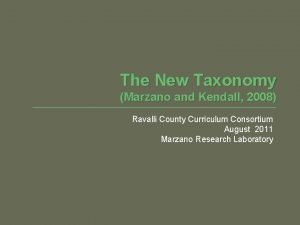Taxonomy Adapted 2018 from Dimensions of Learning Marzano

- Slides: 1

Taxonomy Adapted 2018 from: Dimensions of Learning (Marzano & Pickering); The New Taxonomy of Educational Objectives (Marzano & Kendall) USING KNOWLEDGE: Generating & Testing Hypotheses to… …Address Situations & Issues Decision Making Select from among seemingly equal alternatives • Select the best alternative • Generate criteria to select • What is the best way • Which has the most suitable Situational Problem Solving Invention Develop a new product/process that fulfills a perceived need Accomplish a goal for which obstacles exist • Figure out a way to • Given the conditions/obstacles, how will you reach your goal …Clarify Phenomena & Events • Create a new way to • Devise something that will • Change the way • Improve this situation with a new Experimental Inquiry Offer and test explanations for what is observed • • • If…. . then… What can be predicted What would happen if How would you determine if How can this be explained Investigation Systems Analysis Historical-Projective-Definitional Explain parts of a system and how changing one part influences others • What actually happened when • What would have happened if • Resolve the confusion about • What will happen if • Construct a definition of • Explain purpose of system • Describe how parts affect Resolve confusions related to concepts or events each other • What would happen if this part changes ANALYZING KNOWLEDGE: Examining & Generating…. …Similarities & Differences Comparing Identify similarities & differences among items and ideas • Compare • Contrast • Differentiate • Discriminate • Distinguish Classifying Group items according to similarities • Sort • Categorize • Organize …Arguments & Assertions Analogical Thinking Analyzing Perspectives Constructing Support Show similar relationships for items across domains Identify reasons & logic for perspectives on an issue Build support for assertions or opinions • Create an analogy • Clarify the reasons • Identify the logic • Take a position on • Defend your • Find out why • Explain your for • __ is to __ as __ is to __ • Show the same pattern in both behind someone might think position on reasons • Offer arguments …Logical Inferences Analyzing Errors in Reasoning Identify logical or factual errors • Question the validity of • Listen to insure • Assess • Expose fallacies in Deductive Reasoning Inductive Reasoning Draw conclusions; Apply rules; Apply general statements to specifics; Draw general conclusions from multiple specifics • Carry out/apply the rules of a • Create a principle • Create a rule • What conclusions mental or physical procedure • Predict what will happen • Complete: If…then • Because this is A, what do you know can be drawn COMPREHENDING KNOWLEDGE Symbolizing: Construct symbolic representations of information • Symbolize • Represent • Draw/Illustrate Integrating: Identify basic elements/structure of knowledge • Show the organizational patterns in • Diagram to highlight • Chart • Describe how or why • Identify the key parts of • Trace the development of ideas in • Describe in your own words the effects • Explain ways in which • Paraphrase, Summarize RETRIEVING KNOWLEDGE Recognizing: Identify information related to targeted knowledge • Select • True, False • Match • Identify • Point to Recalling: Produce information related to targeted knowle dge • State • Describe • Explain the major • Who, what, when where • How, why • List, name

